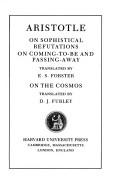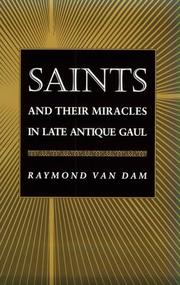| Listing 1 - 7 of 7 |
Sort by
|
Book
ISBN: 2841370275 Year: 1995 Volume: 2 Publisher: Grenoble : Millon,
Abstract | Keywords | Export | Availability | Bookmark
 Loading...
Loading...Choose an application
- Reference Manager
- EndNote
- RefWorks (Direct export to RefWorks)
Putrefaction --- Vampires
Book
Year: 1542 Publisher: Parisiis : apud Ioannem Lodoicus Tiletanus,
Abstract | Keywords | Export | Availability | Bookmark
 Loading...
Loading...Choose an application
- Reference Manager
- EndNote
- RefWorks (Direct export to RefWorks)
Putrefaction --- Reproduction --- Science, Ancient
Book
Abstract | Keywords | Export | Availability | Bookmark
 Loading...
Loading...Choose an application
- Reference Manager
- EndNote
- RefWorks (Direct export to RefWorks)
Fermentation. --- Microorganisms. --- Putrefaction. --- Spontaneous generation.

ISBN: 0674994418 Year: 2014 Publisher: Cambridge, MA : Harvard University Press,
Abstract | Keywords | Export | Availability | Bookmark
 Loading...
Loading...Choose an application
- Reference Manager
- EndNote
- RefWorks (Direct export to RefWorks)
Nearly all the works Aristotle (384-322 BCE) prepared for publication are lost; the priceless ones extant are lecture-materials, notes, and memoranda (some are spurious). They can be categorized as practical; logical; physical; metaphysical; on art; other; fragments.
Logic --- Cosmology --- Fallacies (Logic) --- Philosophy, Ancient --- Putrefaction --- Reproduction --- Sophists (Greek philosophy) --- Amphimixis --- Generation --- Pangenesis --- Procreation --- Ancient philosophy --- Greek philosophy --- Philosophy, Greek --- Philosophy, Roman --- Roman philosophy --- Errors, Logical --- Sophisms (Logic) --- Sophistry (Logic) --- Biology --- Life (Biology) --- Physiology --- Sex (Biology) --- Embryology --- Generative organs --- Theriogenology --- Biodegradation --- Judgment (Logic) --- Reasoning --- Astronomy --- Deism --- Metaphysics
Book
ISBN: 9780197264997 0197264999 Year: 2011 Publisher: Oxford Oxford university press
Abstract | Keywords | Export | Availability | Bookmark
 Loading...
Loading...Choose an application
- Reference Manager
- EndNote
- RefWorks (Direct export to RefWorks)
Richard Rufus of Cornwall was an early Scholastic philosopher-theologian who taught at the Universities of Paris and Oxford between 1231 and 1255. In those years he played a vital part in the transformation of philosophy and theology in early thirteenth-century Western Europe. He pioneered the teaching of metaphysics, physics, chemistry, psychology, and ethics. At Paris Rufus gave the earliest lectures on Aristotelian physics and metaphysics of which a record survives. Although acknowledged as a great scholar in his lifetime, his devotion to the Franciscan ideal of humility led him deliberately to seek obscurity and for 500 years his work was lost or misattributed. This is the second volume of Richard Rufus's writings in the Auctores Britannici Medii Aevi series, a companion to In Physicam Aristotelis also edited by Professor Rega Wood. De Generatione et corruptione is particularly notable for its accounts of divisibility, growth and Aristotelian mixture. This transforms our understanding of the introduction of Aristotelian natural philosophy to the West and provides insight into the early history and prehistory of chemistry.
Causation. --- Four elements (Philosophy) --- Aristotle. --- Four elements (Philosophy). --- Causation - Early works to 1800 --- Four elements (Philosophy) - Early works to 1800 --- Science, Ancient - Early works to 1800 --- Reproduction - Early works to 1800 --- Putrefaction - Early works to 1800 --- Aristotle. - De generatione et corruptione

ISBN: 9780691097664 0691097666 1400850851 0691018162 1306408911 Year: 1976 Publisher: Princeton (N.J.): Princeton university press,
Abstract | Keywords | Export | Availability | Bookmark
 Loading...
Loading...Choose an application
- Reference Manager
- EndNote
- RefWorks (Direct export to RefWorks)
Jung's last major work, completed in his 81st year, on the synthesis of the opposites in alchemy and psychology.
Alchemy --- Alchemy. --- Metals, Transmutation of --- Philosophers' egg --- Philosophers' stone --- Stone, Philosophers' --- Transmutation of metals --- Chemistry --- Occultism --- Adam Kadmon. --- Albertus Magnus. --- Alchemical symbol. --- All things. --- Allegory. --- Allusion. --- Ambiguity. --- Analogy. --- Angelus Silesius. --- Anima mundi. --- Antimony. --- Apotheosis. --- Apuleius. --- Archetype. --- Asclepius. --- Astrology. --- Attis. --- Aurora consurgens. --- Avicenna. --- Azoth. --- Christianity. --- Chthonic. --- Church Fathers. --- Cognomen. --- Concupiscence. --- Consciousness. --- Consummation. --- Deity. --- Demiurge. --- Democritus. --- Dismemberment. --- Emblem. --- Emerald Tablet. --- Explanation. --- Fairy tale. --- Filius philosophorum. --- Firmament. --- God the Father. --- God. --- Good and evil. --- Hermes Trismegistus. --- Illustration. --- Incarnation. --- Incorruptibility. --- Individuation. --- Kabbalah. --- Kenosis. --- Literature. --- Manichaeism. --- Meister Eckhart. --- Moralia. --- Multitude. --- Mysterium Coniunctionis. --- Naassenes. --- Neurosis. --- Nicolas Flamel. --- Nigredo. --- Nous. --- Novum. --- Ostanes. --- Parable. --- Paracelsus. --- Phenomenon. --- Philosopher. --- Philosophy. --- Physis. --- Prima materia. --- Pseudonym. --- Psychic. --- Psychology and Alchemy. --- Psychology of the Unconscious. --- Psychology. --- Putrefaction. --- Pythagoreanism. --- Religion. --- Rite. --- Rubedo. --- Simon Magus. --- Spirituality. --- Sulfur. --- Symptom. --- The Other Hand. --- The Philosopher. --- The Various. --- Theology. --- Thomas Aquinas. --- Thought. --- Tincture (heraldry). --- Treatise. --- Turba. --- Unconsciousness. --- V. --- Vinegar. --- Wickedness. --- World. --- Writing. --- Yesod. --- Yin and yang. --- Zohar.

ISBN: 0691021120 0691032335 9786613891181 1400821142 1283578735 9780691032337 9780691021126 9781400821143 1400819318 Year: 1993 Publisher: Princeton (N.J.) : Princeton university press,
Abstract | Keywords | Export | Availability | Bookmark
 Loading...
Loading...Choose an application
- Reference Manager
- EndNote
- RefWorks (Direct export to RefWorks)
Saints' cults, with their focus on miraculous healings and pilgrimages, were not only a distinctive feature of Christian religion in fifth-and sixth-century Gaul but also a vital force in political and social life. Here Raymond Van Dam uses accounts of miracles performed by SS. Martin, Julian, and Hilary to provide a vivid and comprehensive depiction of some of the most influential saints' cults. Viewed within the context of ongoing tensions between paganism and Christianity and between Frankish kings and bishops, these cults tell much about the struggle for authority, the forming of communities, and the concept of sin and redemption in late Roman Gaul. Van Dam begins by describing the origins of the three cults, and discusses the career of Bishop Gregory of Tours, who benefited from the support of various patron saints and in turn promoted their cults. He then treats the political and religious dimensions of healing miracles--including their relation to Catholic theology and their use by bishops to challenge royal authority--and of pilgrimages to saints' shrines. The miracle stories, collected mainly by Gregory of Tours, appear in their first complete English translations.
Christian pilgrims and pilgrimages --- Christian saints --- Saints chrétiens --- History --- Cult --- Culte --- Histoire --- Gaul --- Gaule --- Religious life and customs --- Vie religieuse --- History. --- 235.3*23 --- Hagiografie: miracula --- 235.3*23 Hagiografie: miracula --- Saints chrétiens --- Pilgrims and pilgrimages, Christian --- Christian shrines --- Pilgrims and pilgrimages --- Saints --- Canonization --- Cult&delete& --- Christian saints - Cult - France - History --- Christian pilgrims and pilgrimages - France - Tours - History --- Martinus ep. Turonensis --- Hilarius ep. Pictaviensis --- Iulianus ep. Cenomannensis --- Gregorius ep. Turonensis --- Aeneid. --- Alternative medicine. --- Amulet. --- Archdeacon. --- Ariamir. --- Arianism. --- Augustine of Hippo. --- Austrasia. --- Baptism of the Lord. --- Brioude. --- Burgundians. --- Burial. --- Caesarius. --- Catholicism. --- Chararic (Frankish king). --- Chlothar I. --- Chlothar II. --- Christianity. --- Church Fathers. --- Clergy. --- Confidant. --- Consecration. --- Deference. --- Desiderius. --- Dysentery. --- Easter. --- Eternal life (Christianity). --- Exorcism. --- Falernian wine. --- Folk healer. --- Fredegund. --- Generosity. --- Georgius. --- God. --- Great martyr. --- Gregorius. --- Gregory of Tours. --- Hagiography. --- Helladius. --- Heresy. --- His Family. --- Historian. --- Humility. --- Intercession. --- Jews. --- Late Antiquity. --- Lent. --- Leprosy. --- Literary criticism. --- Literature. --- Magnus Maximus. --- Marmoutier. --- Martin of Tours. --- Martyr. --- Matricula. --- Merovech. --- Merovingian dynasty. --- Monastery. --- Old Testament. --- Paganism. --- Palladius of Saintes. --- Patron saint. --- Paulinus of Nola. --- Penitential. --- Persecution. --- Peter and Paul. --- Piety. --- Poitiers. --- Pope Gregory I. --- Potion. --- Predestination. --- Procession. --- Putrefaction. --- Radegund. --- Relic. --- Reliquary. --- Remigius. --- Resurrection of the dead. --- Righteousness. --- Rite. --- Roman Gaul. --- Saint. --- School of Graduate Studies (SPS). --- Secularism. --- Self-healing. --- Silvester. --- Slavery. --- Spirituality. --- Suffragan bishop. --- Sulpicius Severus. --- Theodosius I. --- Theology. --- Tomb. --- Tours. --- True Cross. --- Veneration. --- Visigoths. --- Weidemann. --- Word of Faith. --- Writing.
| Listing 1 - 7 of 7 |
Sort by
|

 Search
Search Feedback
Feedback About UniCat
About UniCat  Help
Help News
News